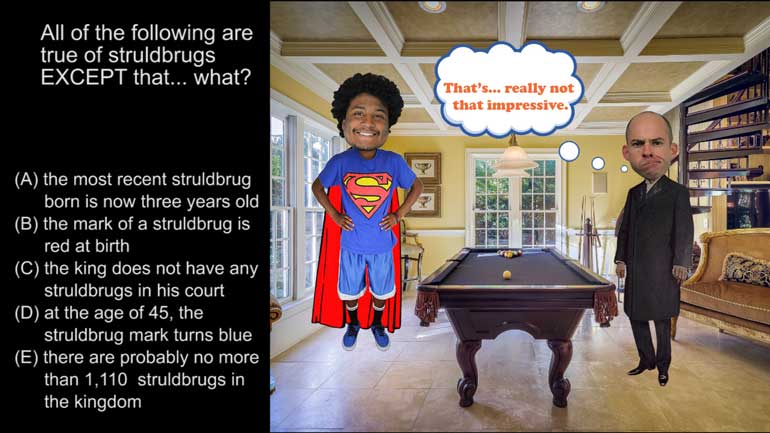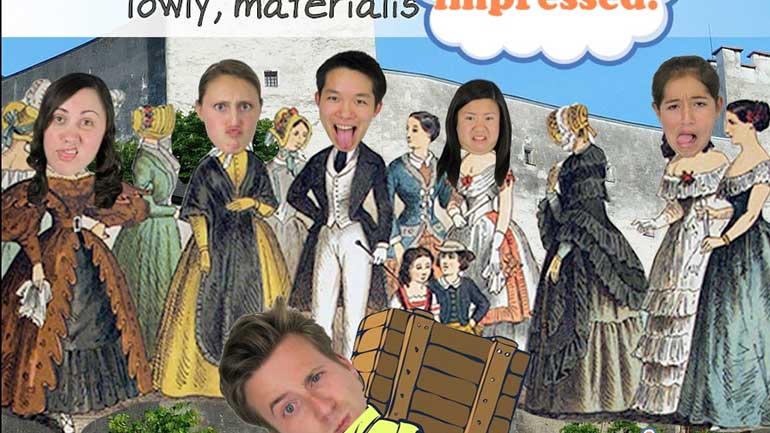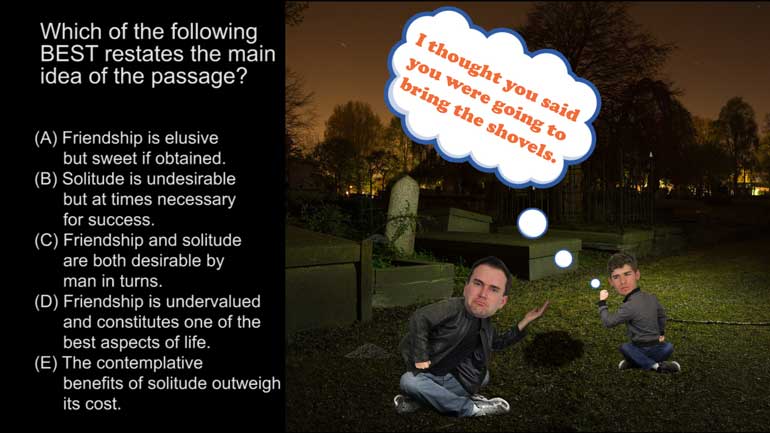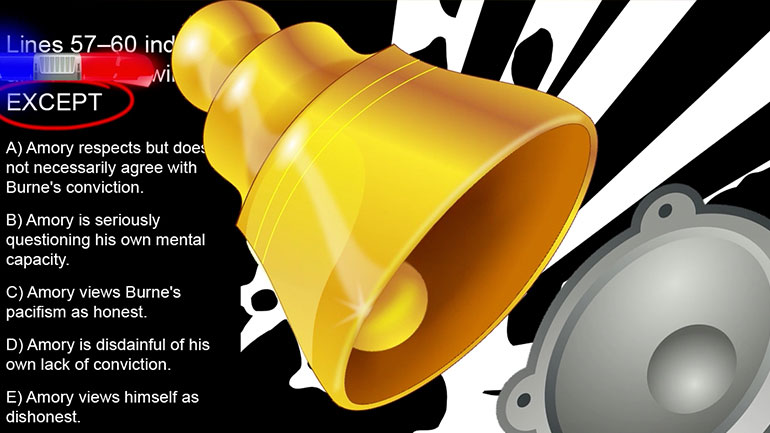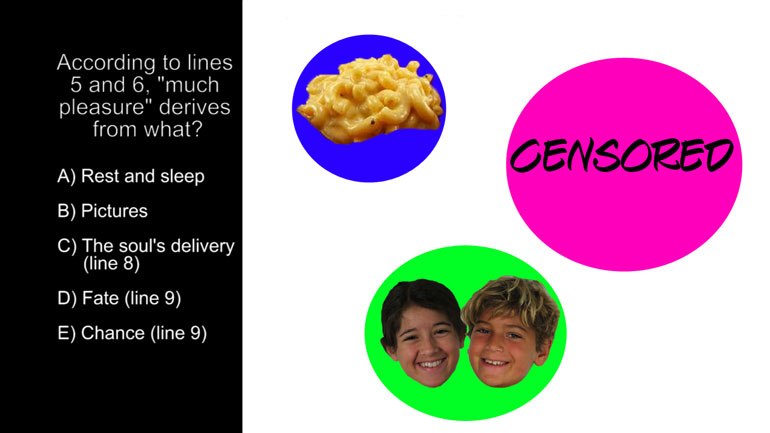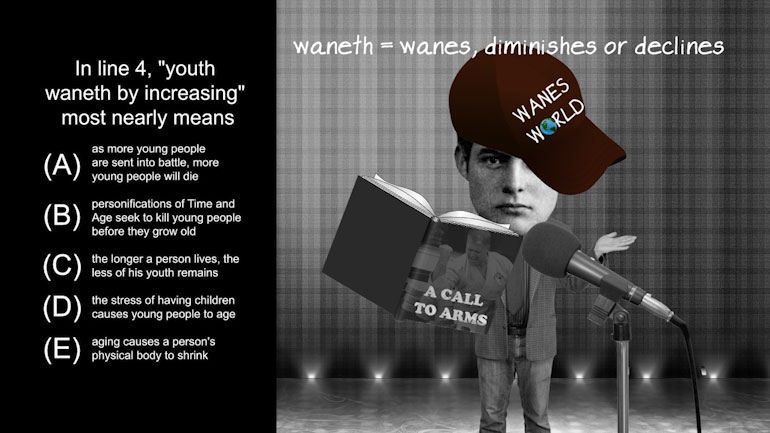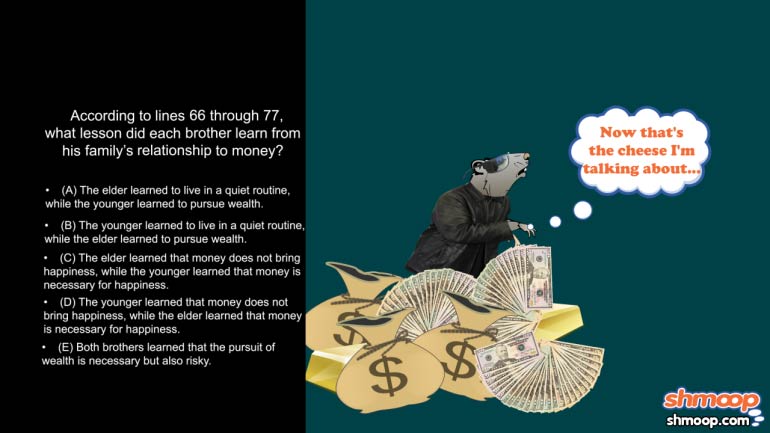ShmoopTube
Where Monty Python meets your 10th grade teacher.
Search Thousands of Shmoop Videos
Literary Comprehension Videos 14 videos
AP English Literature and Composition 1.2 Passage Drill 1. All of the following are true of struldbrugs except that what?
AP English Literature and Composition 1.9 Passage Drill 1. Which of the following is offered as a possible explanation for the struldbrugs' absence...
AP® English Literature and Composition Passage Drill 2, Problem 1. What claim does Bacon make that contradicts the maxim "Whatsoever is delig...
AP English Literature and Composition 1.9 Passage Drill 7 196 Views
Share It!
Description:
AP English Literature and Composition 1.9 Passage Drill 7. According to lines 67 through 77, what lesson did each brother learn from his family's relationship to money?
Transcript
- 00:04
To Shmoop or not to Shmoop, that is... not this question...
- 00:11
Your "pause" finger might be getting a little rusty. Better keep it in shape. Give this
- 00:15
passage a quick skim...
- 00:42
According to lines 66 through 77, what lesson did each brother learn from his family's relationship to money?
- 00:50
And here are the potential answers...
Full Transcript
- 00:55
Ah, if we all could only learn from our family's money problems, rather than repeating their mistakes...
- 01:00
Fortunately, this passage is fiction, so... we can!
- 01:04
Let's start by looking at lines 66 through 77...
- 01:08
"These two brothers had been brought up together in a school at Exeter; and, being accustomed
- 01:13
to go home once a week, had often heard, from their mother's lips, long accounts of their
- 01:16
father's sufferings in his days of poverty, and of their deceased uncle's importance in
- 01:21
his days of affluence: which recitals produced a very different impression on the two: for,
- 01:26
while the younger, who was of a timid and retiring disposition, gleaned from thence
- 01:30
nothing but forewarnings to shun the great world and attach himself to the quiet routine
- 01:34
of a country life, Ralph, the elder, deduced from the often-repeated tale the two great
- 01:39
morals that riches are the only true source of happiness and power, and that it is lawful
- 01:45
and just to compass their acquisition by all means short of felony."
- 01:48
Okay, so we've got a city mouse and a country mouse.
- 01:53
The younger "gleaned from thence nothing," in other words... he didn't really learn anything
- 01:57
from his father's failures or uncle's successes.
- 02:00
He was content to be a bumpkin, "attaching himself to the quiet routine of a country life."
- 02:06
So... he probably had his fill of pigs and chickens and whatnot.
- 02:10
The older brother, on the other hand, deduced that "riches are the only true source of happiness
- 02:15
and power," and that it is "lawful and just to compass their acquisition by all means short of felony."
- 02:23
In English... do whatever it takes to acquire as much money as possible, as long as you're
- 02:28
not breaking the law.
- 02:29
Of course, as we all know, many fabulously wealthy people don't even let that stop them...
- 02:35
Looking over our answer choices, there's only one that says roughly what we just did...
- 02:41
Answer B: The younger learned to live in a quiet routine, while the elder learned to
- 02:45
pursue wealth.
- 02:47
Guess we know who will be staying in whose guest house above the garage in about 10 years...
Related Videos
AP English Literature and Composition 1.4 Passage Drill 3. How is Burne's view of pacifism best characterized in lines 57 through 67?
AP English Literature and Composition 1.9 Passage Drill 4. Lines 32-34 are best understood to mean what?
AP English Literature and Composition 1.2 Passage Drill 4. As which of the following is the object being personified?
AP English Literature and Composition 1.6 Passage Drill 5. Death is primarily characterized as what?
AP English Literature and Composition 1.7 Passage Drill 5. Which line indicates the turn or shift in this poem?
